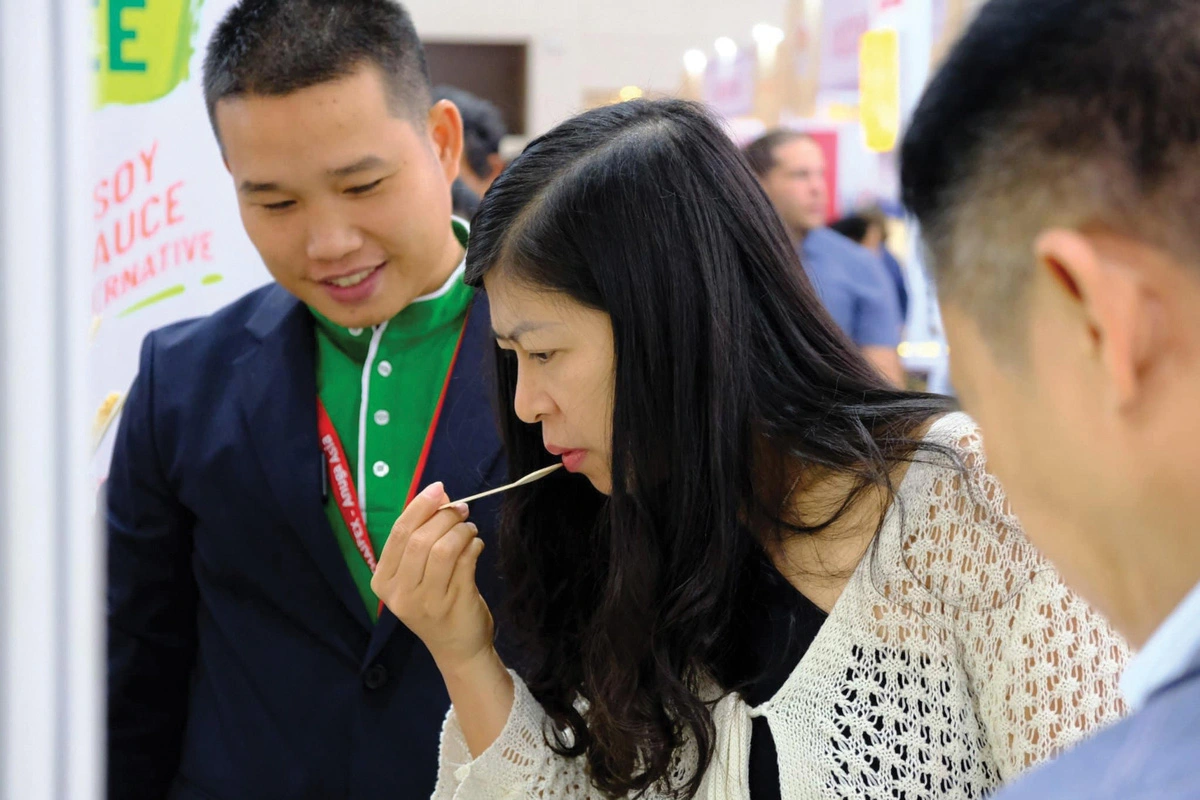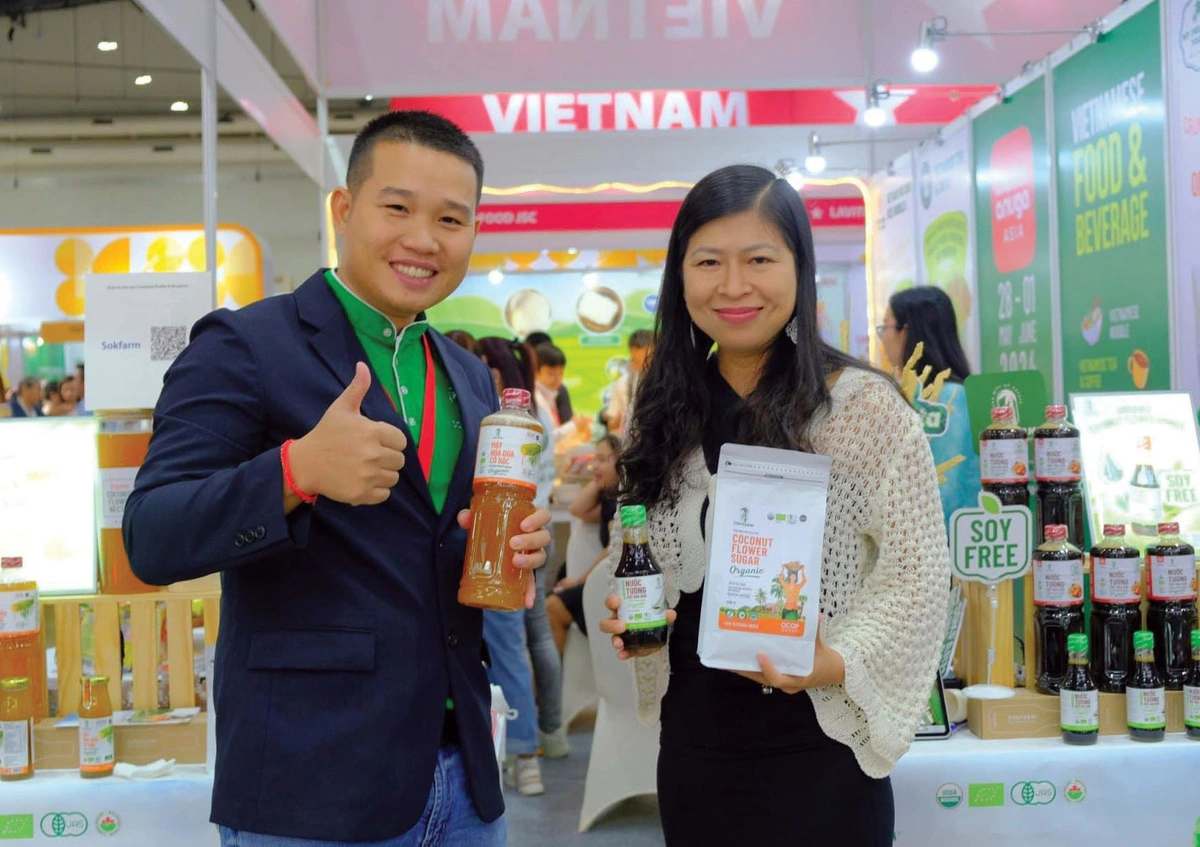With a desire to bring authentic products from Vietnam to the U.S., Nguyen Thi Kim Huyen, also known as Jolie Nguyen, CEO of LNS International Corporation, has chosen a unique path to success.
She is helping many small Vietnamese businesses and startups fulfill their dreams of placing Vietnamese products on supermarket shelves in the U.S..
Kim Huyen is exporting products that embody the essence of regions in Vietnam and contain natural ingredients that adhere to strict American safety standards via official channels.
To date, LNS has brought more than 300 such products to 37 states as well as American e-commerce platforms. Many are surprised to see local delicacies from their homeland suddenly appear across the ocean.
Huyen has been exporting seafood since 2008 and has a strong foothold as a representative for many European companies. For her, nothing compares to the authentic flavors of her homeland.
She had to overcome barriers to bring Vietnamese cuisine, including learning the strict safety standards required for food imports. She recognizes the key to importing into the U.S. is by thoroughly learning and following procedures.
Vietnamese expatriates are very receptive to traditional dishes as they prefer the flavors of their homeland, and such dishes can remind them of their childhood.
|
|
| Nguyen Thi Kim Huyen, also known as Jolie Nguyen, CEO of LNS International Corporation. Photo: Supplied |
For example, ingredients for Vietnam’s grilled banana sticky rice cakes are expensive, hard to locate, and still never seem to create the right flavor in the U.S.. By making the cakes and shipping them from Vietnam, their flavors will be kept, and the prices will be lower, said Huyen.
Huyen does not choose industrial products but looks for classic regional dishes and dishes specific to Vietnam.
Medicinal herbs, healthcare products, and dishes, such as banh chung (square sticky rice cakes), mi Quang (Quang-style noodles), rice porridge, and eel soup, have been certified by the U.S. Food and Drug Administration (FDA) to be packaged, frozen, and exported.
Vietnamese living overseas follow domestic trends
Huyen has noticed that the Vietnamese community in the U.S. follows trends happening back home. Whatever is hot online in Vietnam will soon be sold to online shoppers in the U.S. to satisfy their cravings.
To meet the demand, Huyen searches for and works with businesses in Vietnam, especially small companies, cooperatives, or start-ups looking to export to the U.S..
LNS guides Vietnamese partners on the design, packaging, weight, and quality of products to ensure that they meets the FDA’s standards and is easily accepted by U.S. consumers.
According to Huyen, geographical distance and product preservation during transport are disadvantages of Vietnamese businesses due to long transport time and high transport costs.
|
|
| Kim Huyen (R) has striven to introduce many Vietnamese products to the world. Photo: K.H. |
Huyen’s company and partners have striven to ensure that even packaged and frozen goods retain their flavor, quality, and package information as much as possible.
Vietnam has many regional and unique products that are not available anywhere else, and the Vietnamese community in the U.S. is quite open to new products, Huyen confirmed.
These factors help small and start-up enterprises confidently export their products. Huyen said that no matter how big the exporters are, opportunities are equal if companies comply with the regulations.
She noted that Vietnamese cuisine and agricultural products are no longer limited to the Vietnamese community but are accepted by other consumers in the U.S. thanks to their quality and taste that gradually match international standards.
For example, Mexico and Hawaii also have lychees, but Vietnam’s Luc Ngan lychees are more popular because they have a fragrant aroma when peeled.
Mexican mangoes are cheap but not so sweet as their Vietnamese counterparts.
Therefore, Vietnamese goods are more expensive but U.S. people still love them.
Every time Huyen sees Vietnam’s products gradually appearing on U.S. supermarket shelves, she is touched.
From thousands of miles away, dishes thought to be only limited to a province or region in Vietnam are now sold in the U.S. and potentially many other countries in the future.
"That is our pride, despite all the hardships, we have brought Vietnamese goods to the world,” Huyen said
Not only dried dishes, dishes that are thought to be difficult to pack and transport such as eel soup, banh uot (steamed rice rolls) of north-central Nghe An Province, frog Quang noodles, braised mackerel scad, crab noodle soup, fish porridge of north-central Quang Tri Province, and fresh coconut nectar of southern Tra Vinh Province are also getting on U.S. supermarket shelves.
Like us on Facebook or follow us on Twitter to get the latest news about Vietnam!




















































